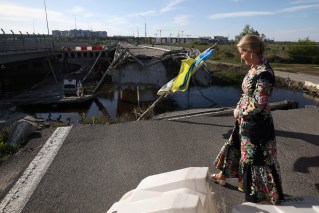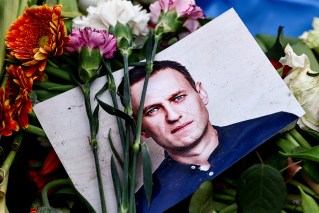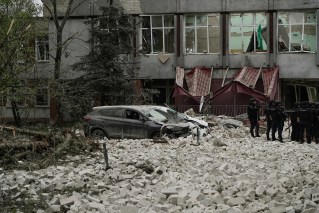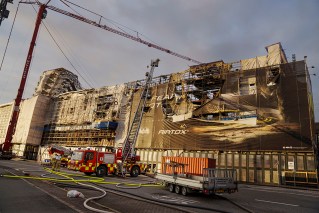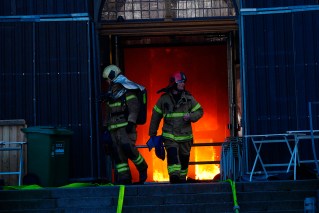‘Last safe day’: Mammoth Russian convoy closes in on Kyiv

A 60-kilometre-long Russian military convoy is advancing on the Ukrainian capital, amid fears the invasion is about to escalate dramatically.
Satellite images from Maxar Technologies show the Russian military convoy has reached the outskirts of Kyiv – and was just 25 kilometres from the city centre as Ukrainians woke on Tuesday morning.
Maxar told CNN the convoy – estimated at about 64 kilometres long – included hundreds of armoured vehicles, tanks, towed artillery and other logistical vehicles.
The massive size of the convoy emerged as Prime Minister Scott Morrison announced an enormous increase in Australia’s pledge of support for Ukraine – including $70 million in lethal and non-lethal defensive aid.
“We will be answering the call from President Zelenskyy. He said ‘Don’t give me a ride, give me ammunition’ and that is exactly what the Australian government has agreed to do,” Mr Morrison said.
“We are talking missiles, ammunition. We are talking supporting them in their defence of their own homeland in Ukraine and we will do that in partnership with NATO.”
Australia’s contribution of humanitarian support – to help international organisations with shelter, food, medical care, water and education support – has also been boosted to $35 million.
Tweet from @AFP
Mr Morrison’s announcement came as Maxar said it had also noted plumes of smoke rising from homes and buildings north and north-west of the town of Ivankiv, which is north of Kyiv.
Maxar said roads were so choked in some areas with military vehicles that it was causing traffic jams. It came as Agence France-Press reported that many Kyiv locals felt that Monday was their “last safe day”.
Also on Tuesday (Australian time), human rights groups and Ukraine’s ambassador to the US accused Russia of attacking Ukrainians with cluster bombs and vacuum bombs, weapons that have been condemned by many international organisations.
Amnesty International and Human Rights Watch both said Russian forces appeared to have used widely banned cluster munitions, with Amnesty accusing them of attacking a preschool in north-eastern Ukraine while civilians hid inside.
“They used the vacuum bomb today, which is actually prohibited by the Geneva convention,” Ukranian ambassador Oksana Markarova said on Tuesday.
“The devastation that Russia is trying to inflict on Ukraine is large.”
The claims are yet to be verified.
Thermobaric weapons do not use conventional ammunition. The BBC reports they are instead filled with a high-pressure explosive, and suck in oxygen from the surrounding environment to generate an extremely powerful explosion and pressure wave.
Human Rights Watch says the bombs have been used before in the Russian republic of Chechnya.
At the weekend, CNN reported seeing a thermobaric rocket launcher near the Russian town of Belgorod.
White House press secretary Jen Psaki said she had seen reports but did not have confirmation that Russia had used such weapons.
“If that were true, it would potentially be a war crime,” she told a press briefing.
Also on Tuesday, International Criminal Court prosecutor Karim Khan said he wanted to investigate Russia for alleged war crimes, but needs the approval of ICC judges to go ahead.
Ukraine has already asked another Hague-based court – the International Court of Justice – to investigate Russia for using fake claims about a genocide as a pretext for invasion.
Tuesday’s developments came as the first round of Ukraine-Russia talks aimed at ending the fighting between the two countries concluded with no immediate agreements.
An aide to Russian President Vladimir Putin said talks with Ukrainian officials lasted nearly five hours.
Vladimir Medinsky headed the Russian delegation in Belarus.
He said the two sides “found certain points on which common positions could be foreseen”.
Another round of talks was agreed to, Mr Medinsky said.
Mykhailo Podolyak, a top adviser to Ukrainian President Volodymyr Zelenskiy, gave few details except to say that the talks – held near the Ukraine-Belarus border – were focused on a possible ceasefire and that a second round could take place “in the near future”.
Mr Podolyak added on Twitter that the negotiations had been difficult.
“The Russian side, unfortunately, still has a very biased view of the destructive processes it has launched,” he said in a tweet.
“The next meeting will take place in the coming days on the Polish-Belarusian border, there is an agreement to that effect,” Mr Medinsky said.
-with AAP



